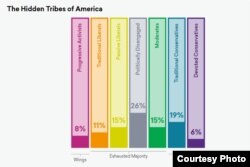A vocal minority has created the false impression that the United States is more divided than ever, according to the largest study ever conducted of U.S. polarization.
The group More in Common was founded in memory of British lawmaker Jo Cox, who was murdered days before Britain voted to leave the European Union in 2016. For the survey, the group reached out to more than 8,000 Americans. What it found was that well-to-do whites on both the left and right political fringes are driving the sense of division, which is continually amplified on social media.
“Even though there’s this sense of division and disruption, actually those extreme views do not represent the majority," says Miriam Juan-Torres, one of the report's authors. "Despite all of the vitriol and heightened feelings since the 2016 election, 77 percent of Americans think the differences between Americans are not so great that they wouldn’t allow us to move forward as a country.”
While it might feel like the country is split in two, the study finds that there are seven distinct groups of Americans. It describes these groups as America's "Hidden Tribes" and says they are distinguished by their beliefs.
The vocal fringes account for only 14 percent of Americans. Eight percent are classified as Progressive Activists and six percent are grouped as Devoted Conservatives.
If the right sounds louder at times, it might be due to the fact that Traditional Conservatives, who make up 19 percent of the electorate, align much more closely with the far right than Traditional Liberals do with the far left. The segment of the population identified as Traditional Liberals accounts for 11 percent of Americans.
Combined, the members of these three tribes — Progressive Activists, Devoted Conservatives and Traditional Conservatives — make up one-third of the population, but their voices have tended to dominate the national conversation.
Caught in the middle of these vocal activists is what the report refers to as the "Exhausted Majority" — the 67 percent of Americans with an enormous thirst for a different kind of politics.
The voices of this group aren't heard very often, even though they make up the majority of America and are tired of political and social polarization. The study finds that this majority holds more flexible views and believes Americans across the political spectrum can find common ground.
"In a sense, the danger of the extremes operating, and the way in which they are operating, the danger of political tribalism and us-versus-them dynamics, is that they’re making it way harder to find collective solutions to shared problems,” says Juan-Torres.
However, Juan-Torres says it is positive that the survey did find an overall feeling of pride in the country and a sense that America can be better and come closer to the ideals enshrined in the nation's founding documents.
“Most people define American identity in similar ways. For the majority of the population, it’s still about freedom, equality and the pursuit of the American Dream, and not, for example, as being white," she says. "A lot of people that I was talking to said that, ‘In the end, we’re all Americans, that we’ll move forward. This is what we do.'"





